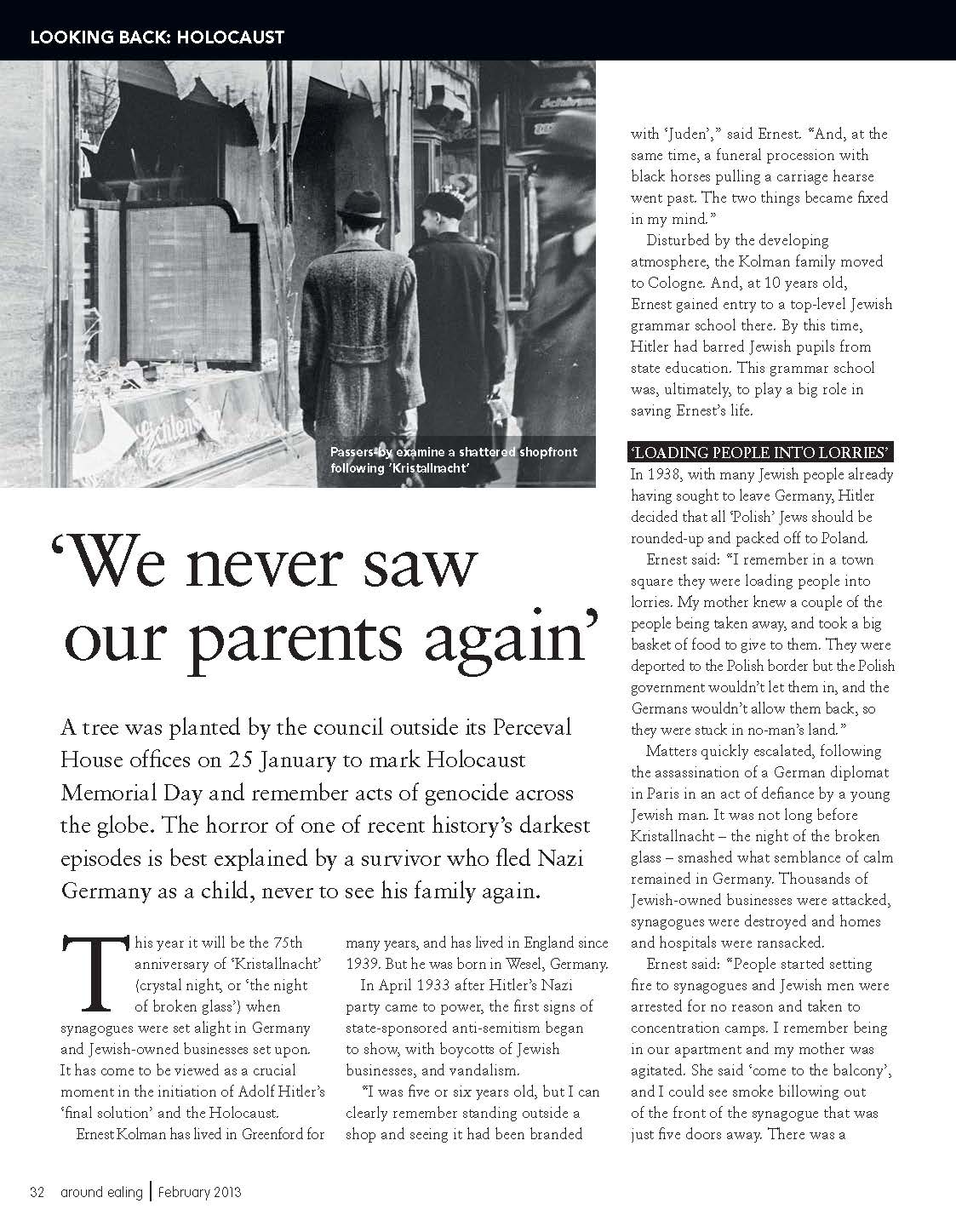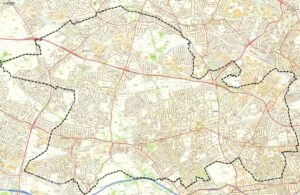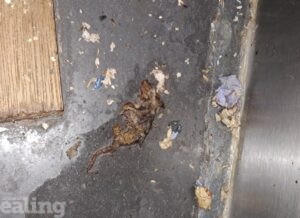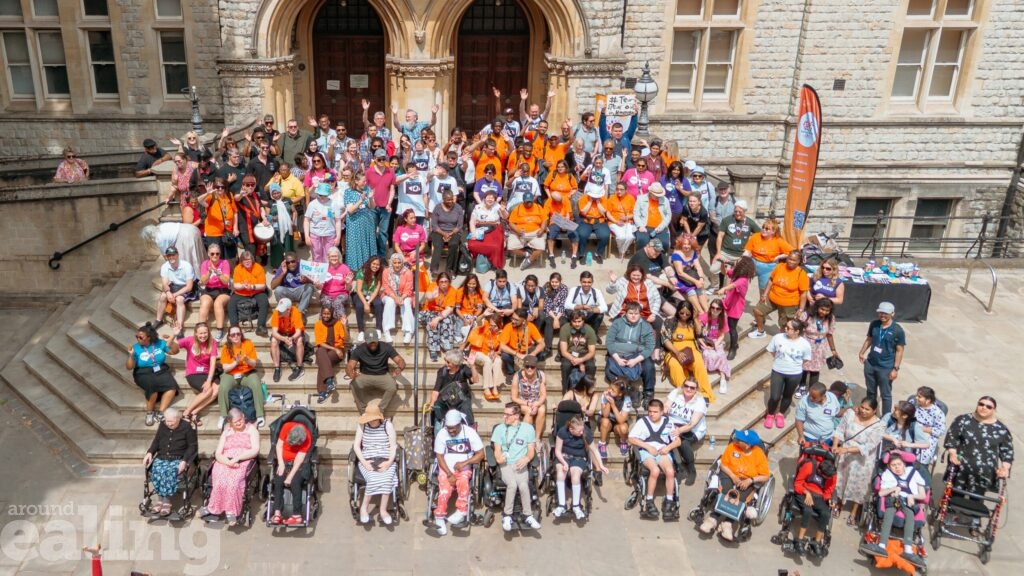On 27 January 2015 it will be the 70th anniversary of the liberation of the Nazi’s nefarious Auschwitz concentration camp.
A tree is planted each January by the council outside its Perceval House offices to mark Holocaust Memorial Day and remember acts of genocide across the globe. The horror of one of recent history’s darkest episodes was explained in Around Ealing magazine in 2013 by a survivor who fled Germany as a child, never to see his family again. His moving account is worth repeating.
November 2013 was the 75th anniversary of ‘Kristallnacht’ (crystal night, or ‘the night of broken glass’) when synagogues were set alight in Germany and Jewish-owned businesses set upon.
It has come to be viewed as a crucial moment in the initiation of Adolf Hitler’s ‘final solution’ and the Holocaust.
WhenRichard Nadal met him, Ernest Kolman had lived in Greenford for many years, and in England since 1939. But he was born in Wesel, Germany.
In April 1933 after Hitler’s Nazi party came to power, the first signs of state-sponsored anti-semitism began to show, with boycotts of Jewish businesses, and vandalism.
“I was five or six years old, but I can clearly remember standing outside a shop and seeing it had been branded with ‘Juden’,” said Ernest. “And, at the same time, a funeral procession with black horses pulling a carriage hearse went past. The two things became fixed in my mind.”
Disturbed by the developing atmosphere, the Kolman family moved to Cologne. And, at 10 years old, Ernest gained entry to a top-level Jewish grammar school there. By this time, Hitler had barred Jewish pupils from state education. This grammar school was, ultimately, to play a big role in saving Ernest’s life.
‘LOADING PEOPLE INTO LORRIES’
In 1938, with many Jewish people already having sought to leave Germany, Hitler decided that all ‘Polish’ Jews should be rounded-up and packed off to Poland.
Ernest said: “I remember in a town square they were loading people into lorries. My mother knew a couple of the people being taken away, and took a big basket of food to give to them. They were deported to the Polish border but the Polish government wouldn’t let them in, and the Germans wouldn’t allow them back, so they were stuck in no-man’s land.”
Matters quickly escalated, following the assassination of a German diplomat in Paris in an act of defiance by a young Jewish man. It was not long before Kristallnacht – the night of the broken glass – smashed what semblance of calm remained in Germany. Thousands of Jewish-owned businesses were attacked, synagogues were destroyed and homes and hospitals were ransacked.
Ernest said: “People started setting fire to synagogues and Jewish men were arrested for no reason and taken to concentration camps. I remember being in our apartment and my mother was agitated. She said ‘come to the balcony’, and I could see smoke billowing out of the front of the synagogue that was just five doors away. There was a semi-circle of gawpers looking on.
“The doorbell rang and we were terrified. My mother answered the door and it was one of our neighbours, a Catholic lady who lived with her grown-up daughter. My mother told me to go with this neighbour, and she took me upstairs to their apartment, to a large wardrobe in a bedroom. She told me to ‘hide in there, and don’t make a noise’. As you can imagine, I was petrified. I was there all day until my mother came to collect me when things seemed to have calmed down outside. I didn’t want to come down. Meanwhile, my father had been away on business and, when he found out what was going on, his chauffeur, who was a Protestant, sheltered him for a week until things had died down. These ordinary German people took a huge risk for us, and showed their humanity and courage.”
Many European countries tightened their immigration controls, fearing an influx of refugees. Even Britain was reluctant to accept adults, but announced that it would allow 10,000 ‘unaccompanied’ Jewish children from Germany. Ernest’s school planned to make sure that as many of its pupils as possible were among those evacuated.
Of the almost 10,000 children who came to these shores, most of us never saw our parents again because they had been murdered in the Holocaust.
DEPARTURE AND FREEDOM
“We departed in the first week of January in 1939. We had to take clothing with us, so my mother had whisked me to all the best shops and filled a big cabin trunk for me to take. Of course, it was searched for valuables by the Nazis.
“Parents were not allowed to come to the train station to see us off. And the last person I shook hands with was a Dr Stein, a religion teacher at our school. I remember the big clock at the station said 5pm.”
A train journey to Holland (where kind Dutch women gave the children food and drink) was followed by a shipping across the English channel, and then a train into Liverpool Street station. The children were put up in a hostel.
“I will never forget that when we got over the German border it was like a heavy stone had been lifted from my shoulders,” said Ernest. “There was a tremendous feeling of freedom – and freedom from the fear of the consequences of doing or saying anything. I still have the ticket from the ship to this day.”
For a couple of years, some of the children would occasionally get parcels from home, and could communicate with infrequent Red Cross ‘letters’ to and from their parents. These were restricted to 25 words each.
But then they stopped coming. It was a torturous five years later that a telegram from Ernest’s uncle, who had also escaped Germany, finally confirmed his worst fears.
‘A BIT OF JUSTICE’
By the time he was 16, and with the Second World War raging, Ernest signed up to the Air Training Corps.
And, when he was 18 he was able to take up active service. But by that time, the war was ending. He did, however, get to fly in an American Flying Fortress bomber on Victory in Europe Day (VE Day) in May 1945. It flew over Germany – and passed over Cologne. Ernest was able to pick out the home he had left six years before, and it was still intact despite the extensive bombing damage in the city: “A little bit of justice dispensed by the almighty God, I think,” said Ernest.
Most important of all, Ernest wants people to remember what happened and guard against it ever happening again.
He said: “I say to people: ‘You have liberty here and you have no idea how precious that is’. I tell my story to make people aware of what a racist policy can lead to and the damage that can be done to children.
“Of the almost 10,000 children who came to these shores, most of us never saw our parents again because they had been murdered in the Holocaust.”
This originally appeared in Around Ealing in 2013 and then, reformatted, in January 2015







